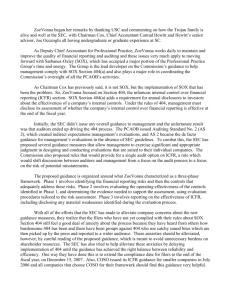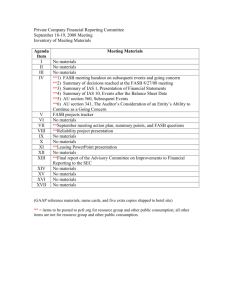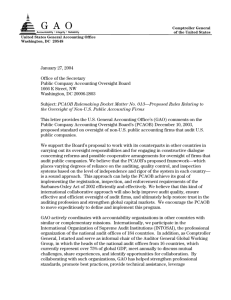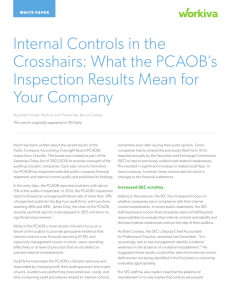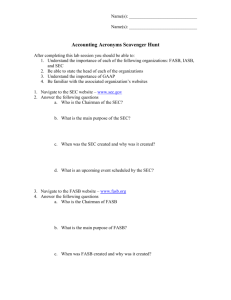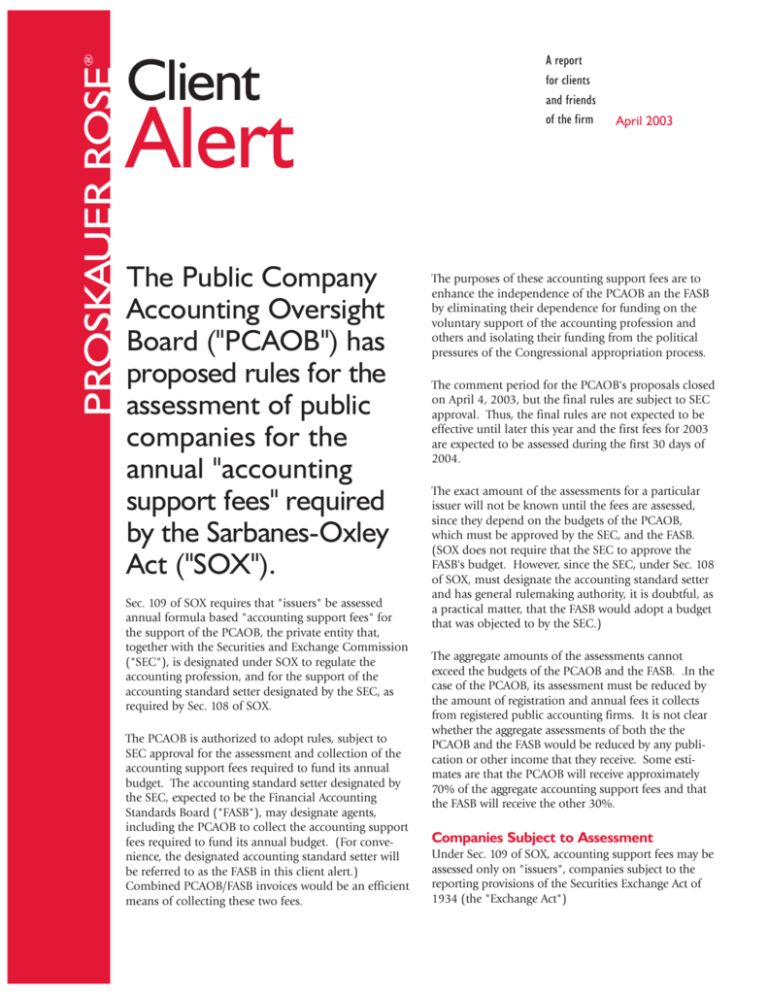
PROSKAUER ROSE
®
Client
Alert
The Public Company
Accounting Oversight
Board ("PCAOB") has
proposed rules for the
assessment of public
companies for the
annual "accounting
support fees" required
by the Sarbanes-Oxley
Act ("SOX").
Sec. 109 of SOX requires that "issuers" be assessed
annual formula based "accounting support fees" for
the support of the PCAOB, the private entity that,
together with the Securities and Exchange Commission
("SEC"), is designated under SOX to regulate the
accounting profession, and for the support of the
accounting standard setter designated by the SEC, as
required by Sec. 108 of SOX.
The PCAOB is authorized to adopt rules, subject to
SEC approval for the assessment and collection of the
accounting support fees required to fund its annual
budget. The accounting standard setter designated by
the SEC, expected to be the Financial Accounting
Standards Board ("FASB"), may designate agents,
including the PCAOB to collect the accounting support
fees required to fund its annual budget. (For convenience, the designated accounting standard setter will
be referred to as the FASB in this client alert.)
Combined PCAOB/FASB invoices would be an efficient
means of collecting these two fees.
A report
for clients
and friends
of the firm
April 2003
The purposes of these accounting support fees are to
enhance the independence of the PCAOB an the FASB
by eliminating their dependence for funding on the
voluntary support of the accounting profession and
others and isolating their funding from the political
pressures of the Congressional appropriation process.
The comment period for the PCAOB's proposals closed
on April 4, 2003, but the final rules are subject to SEC
approval. Thus, the final rules are not expected to be
effective until later this year and the first fees for 2003
are expected to be assessed during the first 30 days of
2004.
The exact amount of the assessments for a particular
issuer will not be known until the fees are assessed,
since they depend on the budgets of the PCAOB,
which must be approved by the SEC, and the FASB.
(SOX does not require that the SEC to approve the
FASB's budget. However, since the SEC, under Sec. 108
of SOX, must designate the accounting standard setter
and has general rulemaking authority, it is doubtful, as
a practical matter, that the FASB would adopt a budget
that was objected to by the SEC.)
The aggregate amounts of the assessments cannot
exceed the budgets of the PCAOB and the FASB. .In the
case of the PCAOB, its assessment must be reduced by
the amount of registration and annual fees it collects
from registered public accounting firms. It is not clear
whether the aggregate assessments of both the the
PCAOB and the FASB would be reduced by any publication or other income that they receive. Some estimates are that the PCAOB will receive approximately
70% of the aggregate accounting support fees and that
the FASB will receive the other 30%.
Companies Subject to Assessment
Under Sec. 109 of SOX, accounting support fees may be
assessed only on "issuers", companies subject to the
reporting provisions of the Securities Exchange Act of
1934 (the "Exchange Act")
Under he Board's proposals fees only would assessed against
the following categories of companies ("Covered Companies"):
Companies with average monthly U.S. market capitalization during their preceding fiscal, years based on classes
of their common stocks. greater than $25 million
("Market Cap Companies"); and
Certain registered investment companies.
Companies in bankruptcy proceedings that are not filing
reports including audited financial statements with the SEC and
employee stock purchase, savings and similar plans and companies with $25 million or less of market capitalization would
not be assessed.
Market Cap Companies would pay of 90% of the aggregate fees
assessed by the PCAOB and the investment companies would
pay the remaining 10%. Although the FASB will be required to
use the same market cap formula as the PCAOB, it is not clear
whether the FASB will use the same categories of Covered
Companies or the 90%/10% allocation proposed by the FASB.
Assessment Procedures
The PCAOB expects to compute the accounting support fees
during the first 30 days of each calendar year, although this may
slip somewhat, particularly with repect to the first assessment..
The PCAOB's proposals do not explicitly address how this will
affect companies with fiscal years ending other than on
December 31. A company that is not a Covered Company at
the time the Board determines the fees will not be assessed.
The assessment formula. Sec. 109 of SOX provides the market
capitalization formula used in the PCAOB's proposals. The
FASB must use the same formula. The formula is:
The numerator is the average monthly equity market capitalization of the issuer for the 12-month period immediately preceding the beginning of the fiscal year to which the
PCAOB's budget relates (It is not clear whether the PCAOB
will budget on a calendar year basis or use the Federal
Government's fiscal year beginning on October 1.);
The denominator is the average monthly equity market
capitalization of all Covered Companies for that 12-month
period.
Notices. The PCOAB proposes to give Covered Companies
notices of their assessments either electronically or by first class
mail to the latest address appearing on the SEC's EDGAR system. Payment would be due within 30 calendar days of the
issuance of the notice. If payment is not received by the thirtieth day, interest would accrue at the rate of 6% per annum. If
payment is not received by the sixtieth day, the PCAOB may
send a second notice. If payment is not received by the ninetieth day, the PCAOB would notify the SEC of the non-payment.
2
No advance public notice or opportunity for comment is
required of the aggregate amount of the annual assessment to
support either the PCAOB or the FASB before those amounts
are determined finally by those entities.
Foreign private issuers. The market capitalization of foreign private issuers would be determined based only on the trading in
the United States of the shares of the classes of their common
stock traded in the United States.
Small business issuers. The PCAOB's proposals will apply to
small business issuers, as defined in SEC rules. However, the
$25 million market capitalization cut off should relieve many
small business issuers from being assessed.
Method of payment. Although the PCAOB's proposed rules do
not so specify, presumably, the payments are to be made to the
PCAOB and not the U.S. Treasury. Also, the proposed rules do
not specify the method of payment, e.g., wire transfer, certified
check or personal check. Nor do the proposed rules provide
instructions for wire transfers, if an issuer should want to use
that method of payment. Presumably, these instructions will
be included in the PCAOB's notice of assessment.
Procedures for disputing assessments. The proposed rules provide
no procedures for disputing an assessment. The PCAOB's
proposing release states that, if a Covered Company disagrees
with an assessment, it should inform the Secretary of the
PCAOB in writing.
Remedies for Non-Payment
The PCAOB has proposed harsh remedies for non-payment of
its fees.
PCAOB assessments. The PCAOB proposes to require a Covered
Company's outside auditors to confirm payment of the fees
assessed by the PCAOB and to preclude the auditors from issuing unqualified reports on Covered Companies' financial statements and the auditors' consents to the inclusion of their
reports on those financial statements in Securities Act of 1933
registration statements. Although not specified in the proposed rule, non-payment presumably does not occur until 31
calendar days after issuance of the assessment notice by the
PCAOB, rather than 31 calendar days after the receipt of the
notice by a Covered Company. The PCAOB's authority to
require an auditor to withhold an unqualified report in these
circumstances is questionable, since it is not expressly provided
by SOX.
The PCAOB also proposes to notify the SEC if payment of the
required fee is not made within 90 days of issuance of the
notice. Failure to pay a required fee is a violation of the
Exchange act. However, a company cannot be prosecuted in a
criminal proceeding for such a violation.
It is not clear how this will apply to Covered Companies with
fiscal years ending other than on December 31, since the audit
reports for their preceding fiscal years may have been issued
before the Board determines the assessment for those companies for that fiscal year.
Due to the harshness of the PCAOB's remedies for non-payment of assessed fees and the proposed requirement for the
outside auditor to confirm payment of the fee, Covered
Companies should develop procedures for determining
whether they are Covered Companies (since their status may
vary from year to year), receipt of assessment notices, payment
of assessments and protests of assessments.
FASB assessments. Neither the FASB nor the SEC have
announced procedures for assessing the accounting support fee
for the FASB. Further, SOX does not require that the SEC
approve the FASB's annual budget.
The PCAOB has proposed that, if it is designated as the agent
for collecting the fees assessed to support the FASB,which is
under consideration by the two entities, it will apply the same
notice and collection procedures that it proposes to apply with
respect to its own assessments. In cases where it acts as the collection agent for the FASB, the PCAOB also proposes to prohibit a registered public accounting firm rendering an unqualified
opinion on the financial statements of a Covered Company, if
it fails to pay an assessment of fees to support the FASB.
However, SOX does not expressly grant the PCAOB, or any
other agent acting for the FASB, the authority to impose such a
penalty.
NEW YORK LOS ANGELES
Conclusion
Although it is too early to predict the amount of an assessment
for a particular company, the PCAOB has estimated that for
every $10 million of its budget the largest Market Cap
Company would pay a fee of $260,000; the 1,500th largest
Market Cap Company would pay $500; and the 3,000th largest
Market Cap Company would pay $100. This does not include
the fees assessed to support the FASB. The annual budget of the
PACABO has been estimated to be in excess of $50 million and
that of the FASB to be about $25 million. Thus, some of the
larger Market Cap Companies may pay more than $1.0 million
in accounting support fees in addition to the audit fees paid to
their outside auditors, which are expected to increase significantly in 2003, particularly since new audit and attest procedures will be require with respect to internal controls over
financial reporting.
Due to the severe consequences of non-payment of PCAOB
assessments, Covered Companies should develop controls and
procedures to assure payment of the required fees within the
time frame required by the PCAOB.
You can also visit our Website at www.proskauer.com
WA S H I N G T O N B O C A R AT O N
N E WA R K PA R I S
Client Alert
Proskauer’s Corporate Governance and Defense Practice
consists of a multidisciplinary team of attorneys from our
Corporate and Litigation practices, including renowned
experts and former SEC and US Attorneys, who bring to bear
considerable sophisticated expertise to serve your needs. The
following individuals serve as the contact persons and would
welcome any questions you might have.
Richard H. Rowe
202.416.6820 — rrowe@proskauer.com
Arnold J. Levine
212.969.3310 — alevine@proskauer.com
Proskauer is an international law firm with more than 590 attorneys who handle
a full spectrum of legal issues worldwide.
This publication is a service to our clients and friends. It is designed only to give general information on the developments actually
covered. It is not intended to be a comprehensive summary of recent developments in the law, treat exhaustively the subjects covered,
provide legal advice or render a legal opinion.
© 2003 PROSKAUER ROSE LLP. All rights reserved.
3

